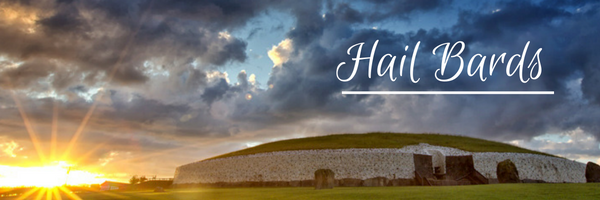Christopher Lee's latest update for The Lore of the Aos Sí
Oct 18, 2016

Hail Bards!
While going through some of the many notes that I have on The Lore of the Aos Sí, I came across a few dusty pieces of parchment, this particular piece contained lore of particular importance, lore concerning the Druids! I have not spoken about the druids much, but they are crucial to the story within the pages of the Lore of the Aos Sí. Enjoy!
Essay on the Order of the Derwyddon ᚛ᚇᚏᚗᚇ᚜ recorded by Ballaton First Spear of the Guardians and Leader of the Seraephym 4493 B.C.E.
In my recent travels, I have been accompanied by the druid Mog Rioth. We are tasked with determining the source of the famine that plagues the lands of Tír na nÓg. It has been many months now and on occasion I am able to engage the druid in conversation that does not directly relate to our charge. Most of my inquiry has centered on the Order of the Derwyddon, or the Druid Order. As their order does not practice the art of marking their stories to parchment, as is the tradition of my people, there is little known about their sacred ways, except that which you hear from their mouths directly. I have taken this opportunity to collect as much information on the secrets of the order from the mouth of one of their most elite.
If one is to understand the way of the druid, one must first examine how they are selected to join the order. This is of particular import due to the many statuses within their order, which can muddle the mind if not properly described. The order selects only one child per year to be raised in their mystical ways. One child of the goddess is named each year on Midsummer’s Eve at the end of the five-day MidSummer festival that honors the victory of the Goddess over Adam in the First Age. This final day of the festival usually coincides with the summer solstice, where the sun has reached its peak energy.
The child named is consecrated as a bard or an ovydd after they journey to their new home at the fortress of Druid’s Oath in the Far North. The bards memorize the sacred poetry and song of the Goddess singing and reciting her grace far and wide. While the ovydds study the arts of herbology and augury to become traveling healers and seers that bring prosperity to her children across many lands. The number of bards and ovydds that exist within the order is unknown, but my companion Mog Rioth believes that they number in only the hundreds.
On the final eve of the festival the named are called to the stone altar to say their vows and shed their blood, binding themselves to the Goddess. In return for their vows, they are given the gift of song or the gift of sight. These powers are among some of the most powerful in the five dominions, which makes induction into the order a grand honor.
At indeterminate times, usually coinciding with the emergence of a Dorcha, the darkening of the lands of the five dominions, one of the named is inducted into the highest rank of the druids. In addition to their vows, the named undergoes a ritual known as the joining.
This ancient, sacred ceremony is of particular interest to me. This ceremony is much like the naming of a bard or an ovydd, but with one key difference. The named child binds his/her soul to the earth itself extending its life so long as the earth itself exists. It is the same ceremony that the Fist of the Goddess underwent in the first age, although according to Mog Rioth, the Order of Five also called the Fist seem to be somewhat transcendent in comparison to others like himself.
After saying their vows, the named child drinks the “tears of the mother” a primordial elixir of the soul, gathered from the well of souls in the Temple of the Mother located in the Eternal City of Formene. Mog tells me that these tears are the same elixir that the Oracle uses to commune with the Goddess at every festival, as well as on a daily basis.
These ‘tears’ retain the memories and essence of those who are to reborn unto the world. This places the named in a kind of trance. Each drop of the elixir contains an individual soul. Thus the named must sift through the thousands of voices in the trance and select a soul companion who acts as the druid’s link to the Goddess. In many ways this joining is akin to the phenomenon of possession. This can have an adverse effect on the named if a soul that is corrupted should take root. If a corrupted soul attaches to the named, he or she must be destroyed to prevent the awakening of Tiamat, the embodiment of chaos, destruction, and corruption that darkened the world in the First Age.
The number of these, the highest order of the druids, is a meager eight. They are so named, Dagda, Falbanach, Myrddin, Pythia, Morrighan, Amyranni, Bécuille, and Mog being the eighth to join the ranks of these, ageless, and indescribably powerful beings. I do not know whether to consider them demi-gods, or akin to the Goddess herself, their powers are extraordinary.
Much is still unknown to me, but I plan to record more of the Order’s sacred ways as I travel with Mog.
~Ballaton, First Spear of the Guardians and Leader of the House of Words